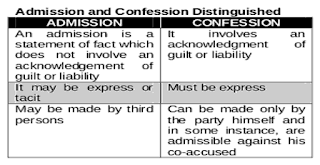Admission By Co-Partner Or Agent

On Evidence
Rule on admission by co-partner or agent:
1. The act or declaration of a partner or
2. Agent within the scope of his authority and during the existence
of the partnership or agency,
3. May be given in evidence against such party
4. After the partnership or agency
a. Is shown by evidence
b. Other than such act or declaration.
5. The same rule applies to the act or declaration of a joint owner,
joint debtor, or other person jointly interested with the party.
The admission of one partner is received against another on the
ground that they are identified in interest , and that each is agent
for the other and that the acts or declarations of one during the
existence of the partnership, while transacting its business and
within the scope of the business, are evidence against the others.
Requisites:
1. That the partnership, agency, or joint interest is established
by evidence other than the act or declaration – partnership
relation must be shown
2. The act or declaration is within the scope of the partnership,
agency or joint interest – the fact that each has individually
made a substantially similar admission does not render the
aggregate admission competent against the firm, this is with
regard to a non- partnership affair.
3. Such act or declaration must have been made during the existence
of the partnership, agency or joint interest.
The declaration of one partner, not made in the presence of his
co-partner, are not competent to prove the existence of a
partnership between them as against such other partner. The
existence of a partnership is cannot be established by general
reputation, humor or hearsay.
Even where one partner is shown to be hostile to another, the
admissions of such first partner may be received, although, of
course, such hostility may affect the question of weight of the
evidence. The declarations of a deceased partner, relating to the
partnership business, are admissible against his survivors.
Declarations or admissions made by a partner after the dissolution
of the partnership are not competent against the other partners in
the absence of prior authority or subsequent ratification, even
though such declarations relate to matters pending at the time of
dissolution.
With respect to the relevant substantive provisions on these matters,
refer to the Civil Code provisions on partners, agents, co-owners
and solidary debtors.
NOTE: As a rule, statements made after a partnership has been
dissolved do not fall within this exception, but where the admissions
are made in connection with the winding up of the partnership
affairs, said admissions are still admissible as the partner is
acting as an agent of his co-partners in said winding up.
What is done by an agent is done by the principal through him, as
through a mere instrument.
The admission or declaration of an agent subsequent to a transaction
in controversy, or after this agency has terminated are not binding
upon, or evidence against his principal. But when the admission or
declaration is made at the time of the transaction, or during his
employment, when it pertains to the matter in hand, as agent, which
is within the cope of his employment, his admissions and declarations
are competent, though not conclusive against his principal.
When a party to any proceeding expressly refers to any other person
for an answer on a particular subject in dispute, such answer, if
restricted to the subject matter in relation to which the reference
is made, is in general, evidence against said party, for the reason
that he makes such third person his accredited agent for the purpose
of giving such answer.
The admissions of a third person are receivable in evidence against
the party who has expressly referred another to him for information
in regard to an uncertain or disputed matter.
But such a reference does not make the person referred to an agent
for the purpose of making general admissions, the declarations are
not evidence unless strictly within the subject matter in
relation to which reference is made.
When the reference was not made to any particular person but in
general, the rule above-stated is not applicable.
Admissions by counsel are admissible against the client as the
former acts in representation and as an agent of the client, subject
to the limitation that the same should not amount to a compromise or
confession of judgment.
The phrase “joint debtor” does not refer to mere community of
interest but should be understood according to its meaning in the
common law system from which the provision was taken, that is, in
solidum, and not mancomunada.
The quantum of interest of the declarant does not affect the
application of the rule. It is the fact of joint interest, not
the size of the fractional part, which governs. If he is liable to
the plaintiff in the same manner that his co-defendants are liable,
the extent to which they are bound by his admission cannot be
measured or graduated by the quantity of his interest in the
contract.













